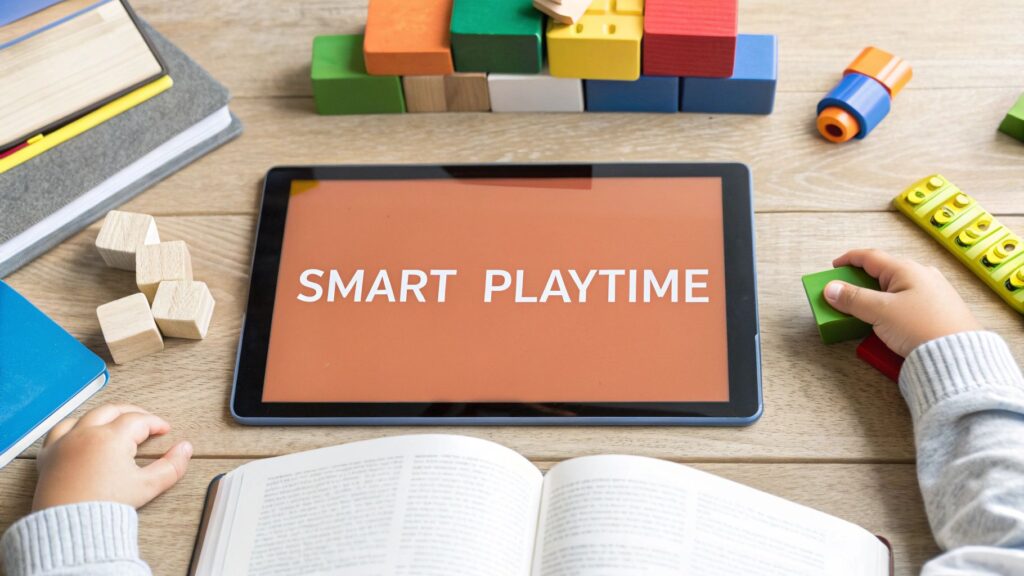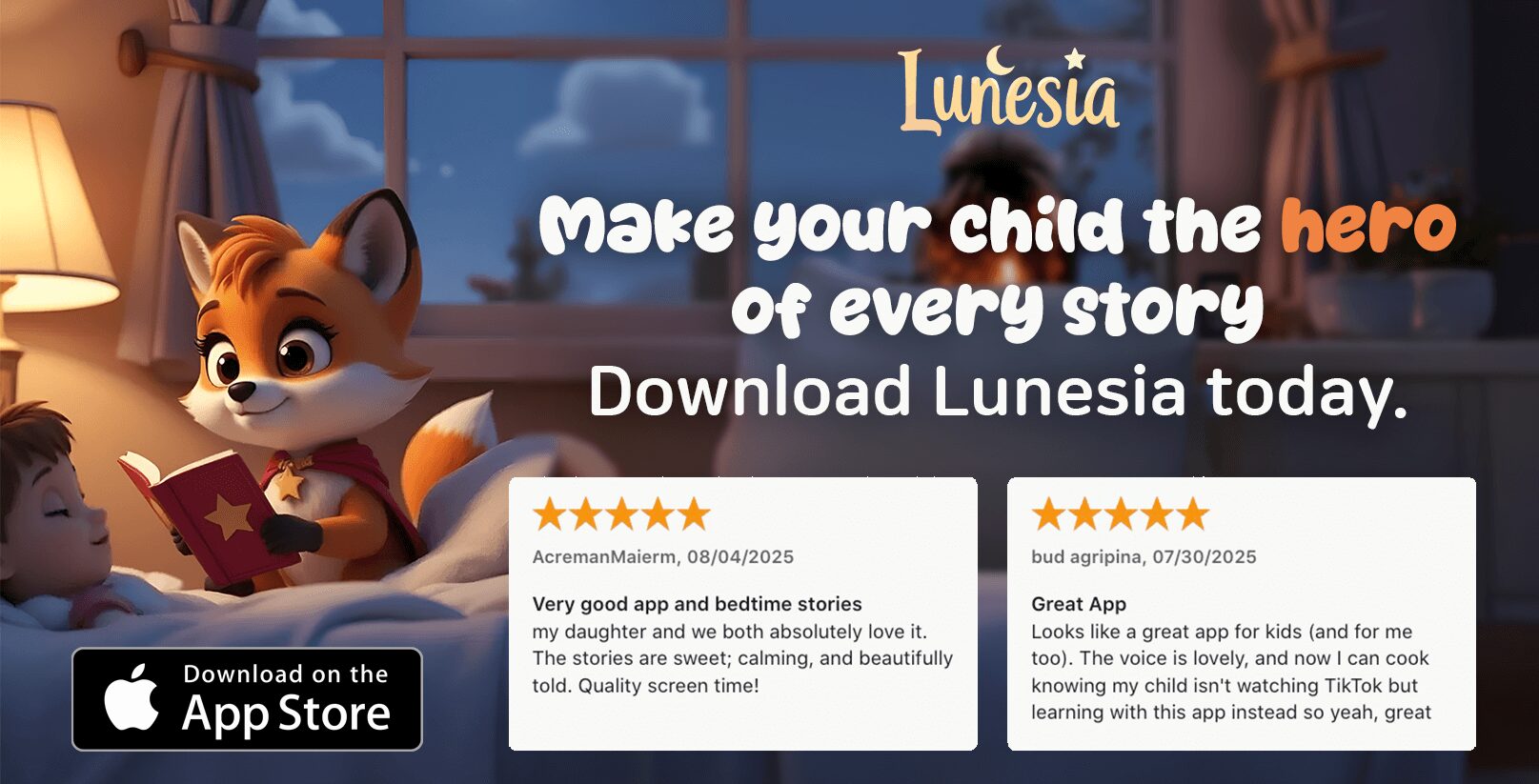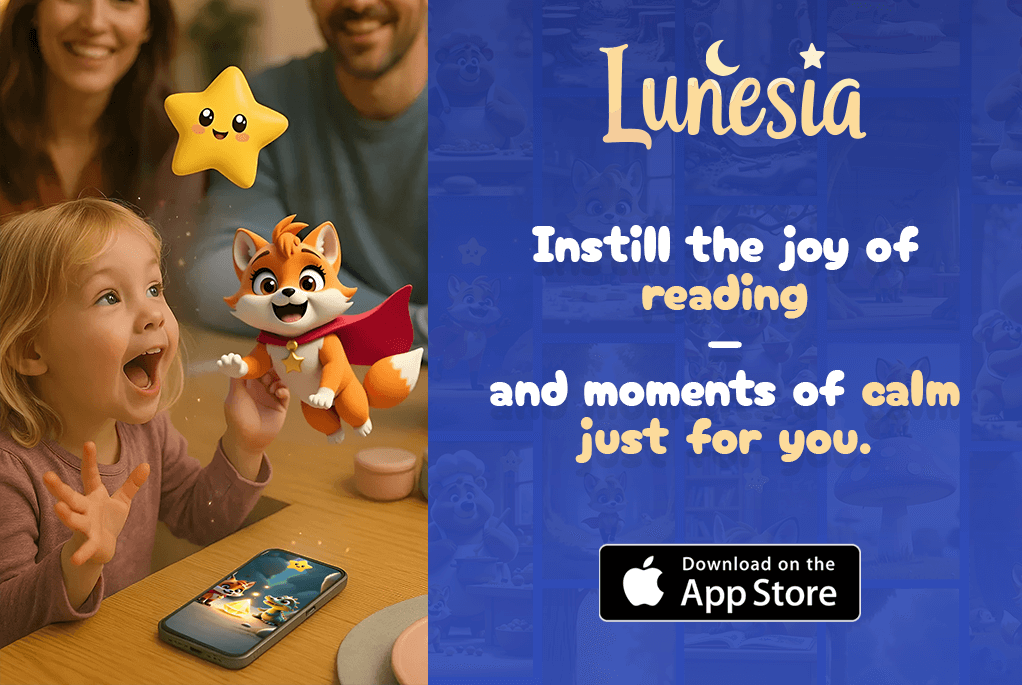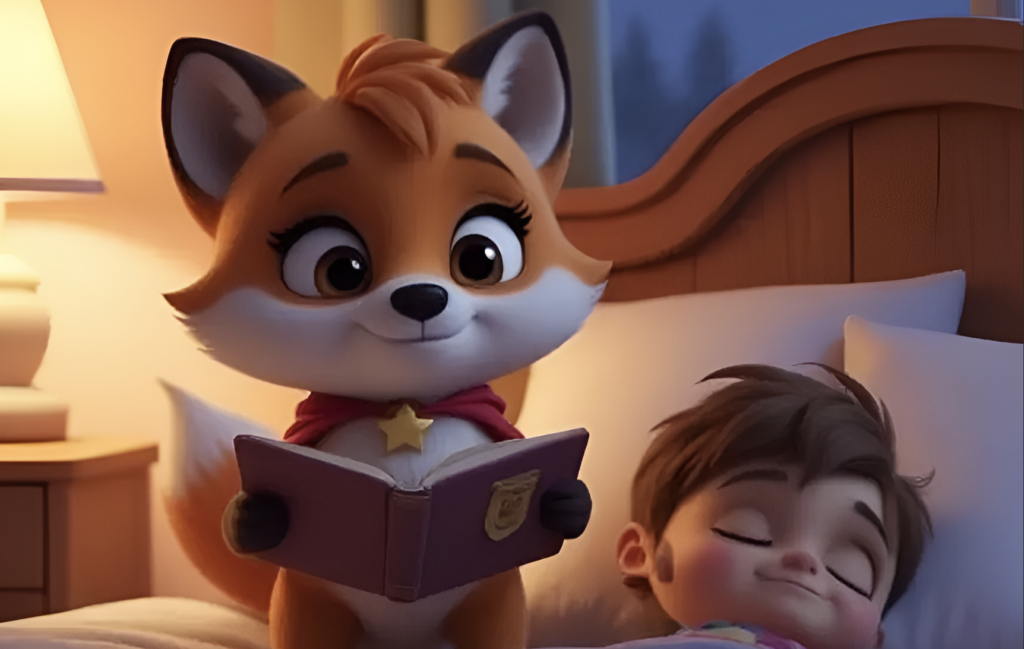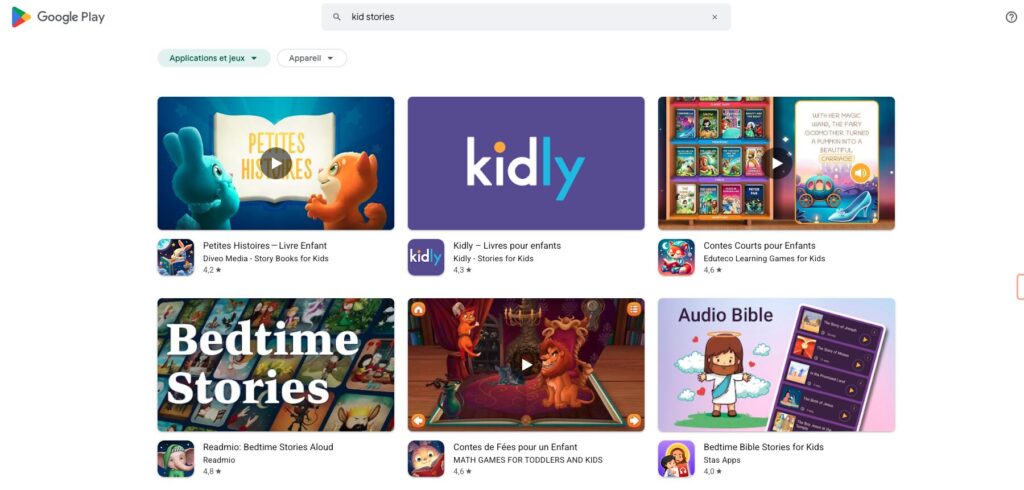Are you searching for the best educational apps for preschoolers? Let’s be honest, what you're really looking for is peace of mind in a pixelated world. The truth is, the best apps go way beyond flashy colors and noisy sound effects. They focus on ad-free, interactive learning that actually helps build real-world skills your child will use for a lifetime.
Imagine turning screen time into a genuine growth opportunity. With apps like Lunesia, you can, using beautiful interactive stories to nurture your child’s emotional intelligence, kindness, and courage right from the start.
Your Guide to Guilt-Free Screen Time
Ever hand your child a tablet and feel that little pang of guilt? We’ve all been there. You scroll through an app store flooded with thousands of options, wondering which ones are truly good for your child and which are just digital babysitters in disguise.
You're not just looking for a distraction while you make dinner; you’re looking for a tool that sparks curiosity and helps your little one grow—all without the constant pop-ups for toys they don’t need.
Feeling lost in this digital jungle is completely normal. But what if you could transform that screen time guilt into unshakable confidence? The secret isn't about banning screens entirely, but about choosing them with intention.
What Makes an App Truly Educational?
Have you noticed how some apps seem to hypnotize kids, while others get them thinking and giggling? A truly great app invites your child to be an active participant, not a passive observer. It's the difference between mindlessly tapping bright buttons and making a thoughtful choice that actually changes a story's outcome. This is where apps like Lunesia truly shine.
Instead of just listening to a story, your child steps into the hero's shoes. Do they help the shy squirrel share its nuts or keep them all for itself? Their decisions teach them about kindness, courage, and empathy.
These aren’t just bedtime stories; they’re engaging, value-rich journeys where children build emotional resilience. And here's the bonus for you: while your child is immersed in a meaningful adventure, you gain something invaluable—precious time for yourself, completely guilt-free, knowing they are learning and safe. While making screen time positive is key, it also helps to understand the concept of a digital detox to ensure your family finds a healthy, happy balance.
Quick Checklist for a Great Preschool App
Ready to cut through the noise and spot the hidden gems in the app store? Here’s a simple checklist to help you pick apps that truly benefit your little one.
| Feature | Why It Matters for Your Child | What to Look For |
|---|---|---|
| Ad-Free Environment | Protects your child from distracting and often inappropriate commercial content. | Look for apps with a one-time fee or a clear subscription model with no third-party ads. |
| Interactive Storytelling | Teaches cause and effect, problem-solving, and empathy by letting them shape the narrative. | The app should allow children to make meaningful choices that impact the story's direction. |
| Focus on Soft Skills | Builds emotional resilience, kindness, and courage—skills crucial for school and life. | The app's core content should revolve around character development and emotional learning. |
| Parental Controls | Ensures you can manage screen time limits and access to content. | Check for features like built-in timers and customizable settings. |
Using this quick framework can make evaluating any new app a breeze, helping you feel confident that you're choosing quality over clutter every single time.
What Great Apps Teach Beyond the ABCs
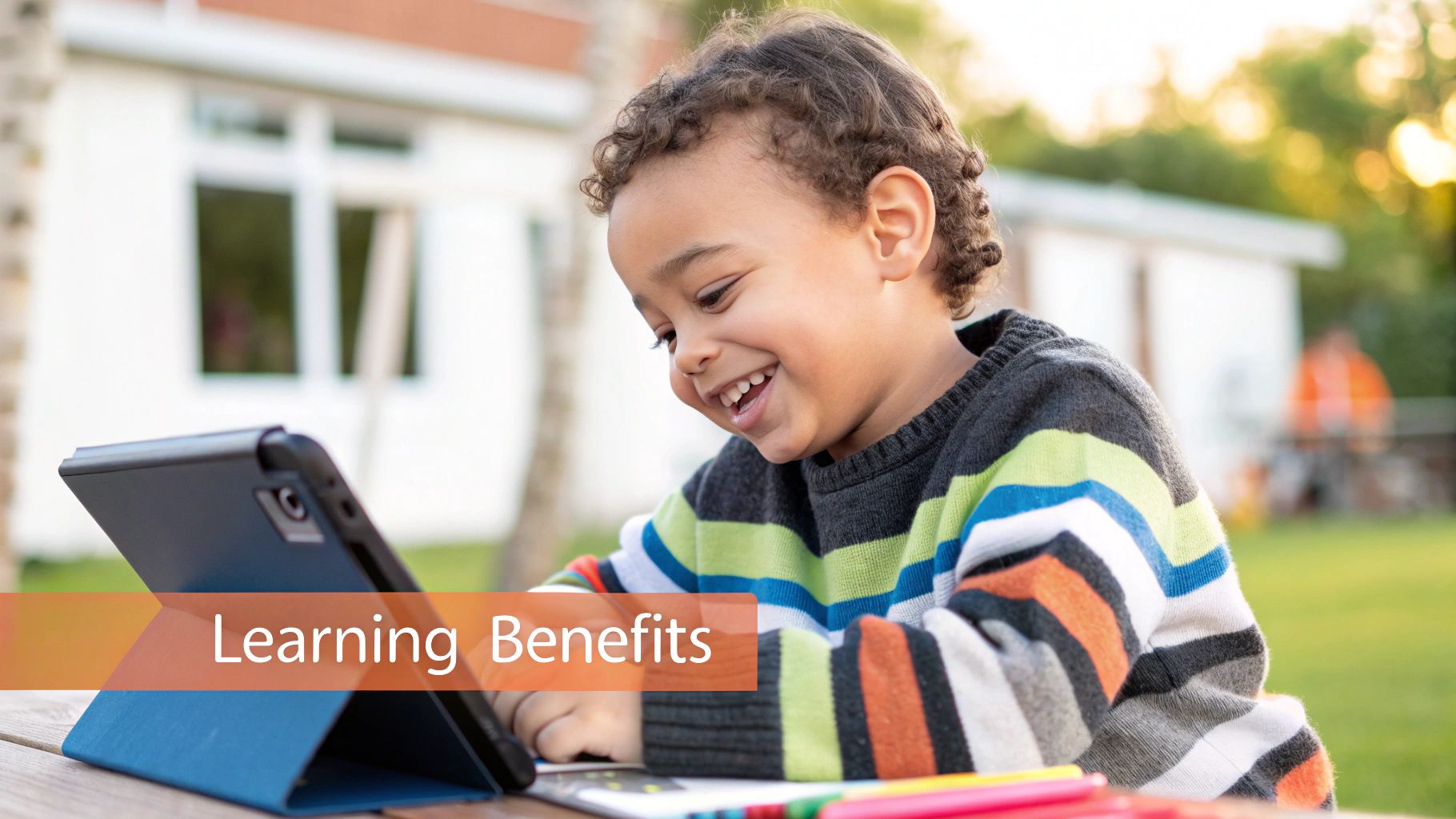
Does a simple counting game really prepare your child for kindergarten and beyond? While knowing letters and numbers is a huge milestone, the skills that truly matter for a happy, successful life run much deeper.
We’re talking about the "soft skills" that don't show up on report cards but make all the difference: resilience, kindness, and creative problem-solving. Imagine an app that doesn’t just teach the alphabet but also teaches the courage to try again after a mistake.
This is the magic of interactive storytelling. When your child guides a character through a tricky situation—like sharing a toy or facing a fear of the dark—they aren't just playing a game. They’re practicing empathy. They’re learning about consequences and cooperation in a safe, gentle space.
Building Emotional Toolkits Through Play
Think of these interactive stories as a playground for emotions. Have you ever wondered how to teach your child to be more compassionate? A well-designed app helps them build an essential toolkit for navigating their feelings.
For instance, when a story character feels sad and your child has to choose how to comfort them, they are actively learning about compassion. When a character is scared to try something new, and your child encourages them to be brave, they are building their own confidence.
This approach is at the heart of Lunesia, where stories are specifically crafted to be practice grounds for life’s big feelings. The app turns screen time into a genuine opportunity for your child to make decisions, see different points of view, and learn firsthand how kindness can change everything.
An app’s real value isn’t just in what it teaches, but in the character it helps build. By focusing on emotional intelligence, we give our children a foundation for lifelong success and happiness.
This focus on deeper learning is why the preschool education software market is booming. A recent report from the National Association for the Education of Young Children (NAEYC) highlights that high-quality digital tools can significantly support social-emotional development. Parents are hunting for tools that do more than just entertain—they want apps that build good humans, not just good students.
From Tantrums to Resilience
So how does any of this help when your three-year-old is having a meltdown over the "wrong" color cup? By regularly engaging with stories about frustration and problem-solving, your child is subconsciously banking coping mechanisms.
Instead of just feeling overwhelmed by a big emotion, they have a mental library of strategies they’ve seen work in their favorite adventures. They start to understand that feeling angry is okay, but there are positive ways to handle it. That's how digital stories can help build real-world emotional resilience, one small choice at a time. To discover more about this topic, check out our guide on educational apps in 2025.
Spotting Real Learning vs. Digital Babysitters
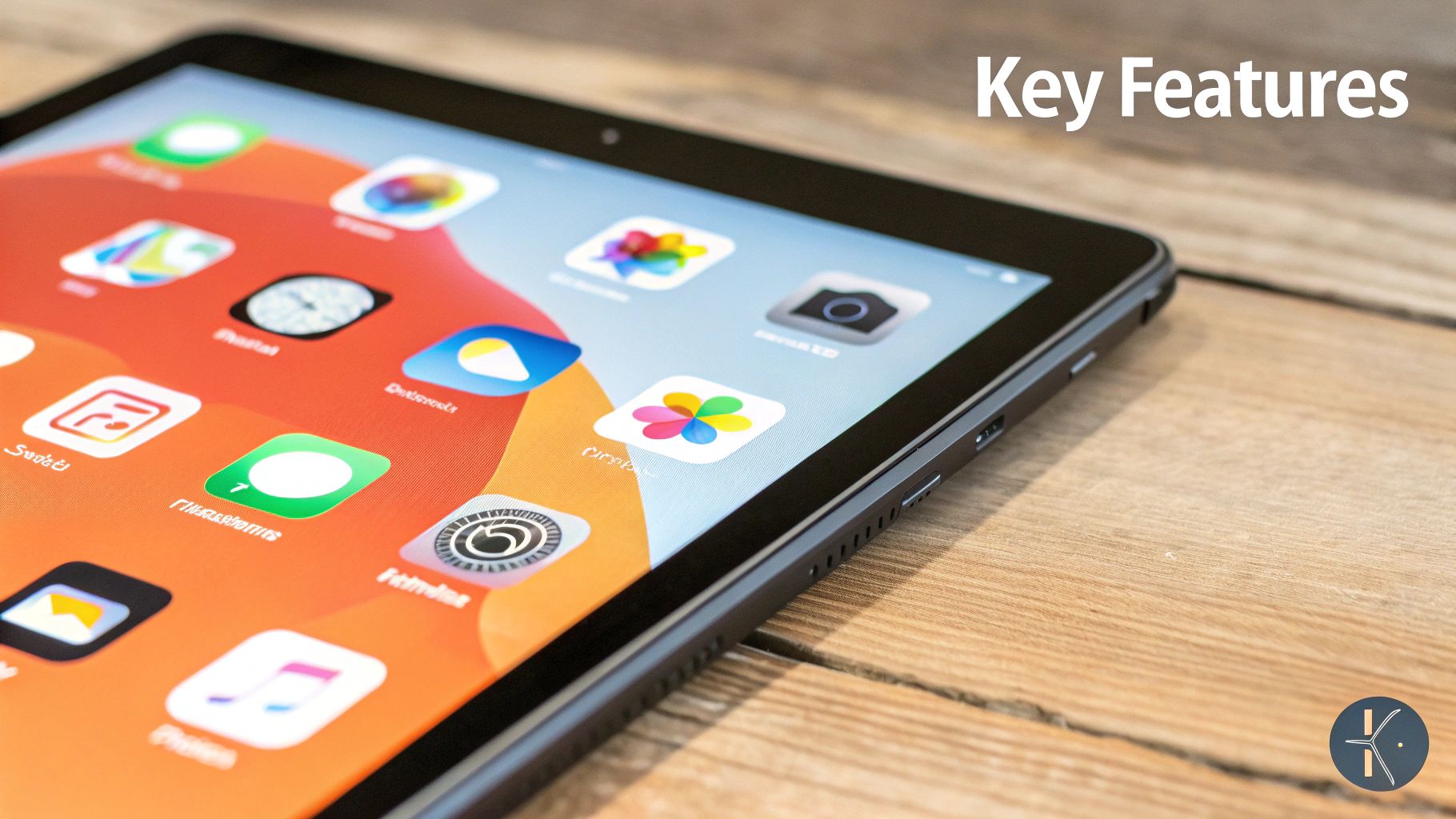
Have you ever glanced over your child's shoulder only to see them mindlessly tapping away at flashy, noisy buttons on a tablet? You're definitely not alone. It's a classic trap—so many "educational" apps are little more than tiny slot machines, designed to keep kids hooked rather than helping them grow.
So, how can you tell the difference between a genuinely great learning tool and a simple digital babysitter?
The secret is asking one simple question: is your child being an active participant or just a passive consumer? A fantastic app gets them thinking, not just tapping. It sparks their curiosity and encourages them to ask "what if?" instead of just showing them "what's next." Think of it as the difference between watching a cartoon character solve a puzzle and becoming the character who solves it themselves.
The Green Flags of a Great Learning App
As you're sifting through the app store, keep an eye out for these telltale signs of a quality experience. These are the green flags that signal real, meaningful learning is happening.
- Open-Ended Play: Does the app feel more like a digital sandbox than a narrow, one-way street? The best apps let kids experiment and create without a rigid set of rules, giving their imagination room to run wild.
- Problem-Solving Challenges: Look for gentle challenges that require actual thought. Instead of simple matching games, a great app might ask a child to help a character navigate a maze or figure out how to share a toy with a friend.
- Choices with Consequences: Meaningful interaction is everything. In an app like Lunesia, a child isn't just listening to a story; they're making decisions that actually shape the adventure. This is how they learn about cause and effect in a powerful, memorable way.
These elements don't just teach facts; they foster critical thinking and emotional resilience. They help your child build a mental toolkit they can use to navigate real-world situations, from the playground to the classroom.
Red Flags to Watch Out For
Just as important as knowing what to look for is knowing what to avoid. If you spot these red flags, it might be time to hit "uninstall."
Distraction is the enemy of deep learning. An app filled with pop-up ads and constant rewards for meaningless tasks is training your child's brain for instant gratification, not thoughtful engagement.
Many apps rely on flashy animations and a constant stream of "rewards" to keep kids hooked, which can actually get in the way of real learning. One study even found that excessive visual and auditory effects in digital stories can distract children and reduce how much they understand. The goal should always be engagement, not overstimulation.
This is why a safe, ad-free environment is non-negotiable. When an app is free from third-party ads, you can trust that its only goal is to support your child’s development. That’s something apps like Lunesia prioritize, ensuring your child's adventure is never interrupted by a commercial.
For a deeper dive, check out our complete guide on how to spot an educational app and avoid the duds.
How to Make Screen Time Productive and Positive

Let's be honest for a second—parental guilt over screen time is real. We’ve all felt that little pang of worry, wondering if we’re making the right choice for our kids. But what if you could completely reframe that time from a necessary evil into a powerful tool for connection and growth?
The secret isn’t about counting minutes; it’s about making the minutes count. It's about shifting our focus from quantity to quality and turning a potential source of conflict into a positive, shared experience. With the right approach, screen time can become an ally in your parenting toolkit, not something you have to constantly battle.
Setting Boundaries That Actually Work
Have you ever tried to enforce a "no screens" rule, only to face a full-blown meltdown five minutes later? You’re not alone. The key is creating predictable routines rather than sudden, jarring cutoffs. Instead of using screen time as a last-resort bargaining chip, try integrating it into a specific part of your day, like during the 30 minutes you need to make dinner.
This consistency helps your child know exactly what to expect, which dramatically reduces those exhausting power struggles. For more ideas, you can explore our guide on how to successfully incorporate educational apps into your daily routine. When you set clear expectations, screen time transforms into just another calm, structured part of the day.
The Real Bonus: Guilt-Free Time For You
Here's the part we don't say out loud enough: you deserve a break. And you shouldn't have to feel a shred of guilt for needing one. When your child is deeply immersed in a meaningful, age-appropriate adventure, you gain something incredibly precious—a moment to just breathe.
Picture this: your child isn't just mindlessly tapping away. They’re helping a brave character find their courage or solving a puzzle to help a friend. While they're engaged in a safe, ad-free world like Lunesia, you get to recharge, knowing they aren't just occupied, but actively learning crucial life skills like empathy and problem-solving.
This isn’t about being a "perfect" parent; it’s about finding sustainable ways to manage the beautiful chaos of family life. In fact, a recent survey found that 68% of parents see educational apps as a key tool for balancing their own needs with their children’s development. Choosing wisely means you get that much-needed time for yourself, confident that your child is safe, happy, and growing.
Helping Kids Navigate Big Feelings with Digital Stories
What happens when your preschooler has a full-blown meltdown over a broken crayon? Or when they wake up terrified from a bad dream? Those big emotions can feel completely overwhelming—for them and, let's be honest, for us too. But what if you had a secret ally in your pocket, ready to help you both through those tough moments?
Interactive stories are one of the most gentle yet powerful ways to help little ones understand and manage what they're feeling. I've found that just telling a child to "be brave" rarely works. But when they get to feel brave by helping a story character make a courageous choice? That’s a whole different ballgame. They're not just listening; they're building their own emotional toolkit for the real world.
This is exactly how the best educational apps for preschoolers become more than just a way to pass the time. They become practice grounds for life.
From Digital Choices to Real-World Confidence
Think about the common hurdles you face every day: tantrums over sharing, anxiety about trying new foods, or the classic fear of the dark. Now, picture your child exploring these very scenarios in a safe, guided story.
When a character in an app like Lunesia feels sad because a friend won’t share a toy, your child gets to decide what happens next. Do they help the character snatch the toy back? Or do they choose a kinder path, like suggesting they take turns? These aren't just taps on a screen; they are active lessons in empathy and problem-solving.
By making decisions within a story, children are essentially rehearsing for life. They learn that their choices have outcomes, and that kindness and courage are superpowers they can use anytime.
Each choice reinforces the idea that they are capable of handling tricky social situations. This builds the kind of deep, unshakable confidence that helps them navigate playground squabbles and new classroom jitters with a little more grace.
Taming Tantrums and Soothing Fears
Let's talk about tantrums. I’ve seen it a hundred times—they often happen because a child is flooded with an emotion they can't name or control. Research shows that developing emotional literacy—the ability to identify and express feelings—is crucial for self-regulation. Interactive stories are brilliant for this.
- Naming the Feeling: Stories give words to big emotions. When a character says, "I feel frustrated because I can't build my tower," it helps your child connect the word "frustrated" to that familiar, tangled-up feeling.
- Modeling Coping Strategies: Instead of just getting angry, a character might take a deep breath or ask for help. Your child sees these strategies in action, making them much more likely to try them out later.
This is especially powerful for tackling common fears. Lunesia offers adventures where children help characters face their fear of the dark or the anxiety of being alone. By guiding their new friend through the challenge, your child becomes the hero, internalizing that same bravery for when their own lights go out at bedtime. And while they're immersed in this positive experience, you get that priceless, guilt-free moment to yourself, knowing they’re not just safe—they’re building resilience.
How to Choose the Right App for Your Family
Ready to finally hit ‘download’? Before you do, let’s take a moment. Think of yourself as the thoughtful curator of your child's digital world—because you are. This simple guide will help you confidently sort through the noise and find apps that genuinely protect and nurture your little one.
First off, let's look beyond the flashy icons and five-star ratings. A truly great app should feel like a partner on your parenting journey, not just another distraction to keep them busy. It needs to grow with your child, offering gentle challenges that match their developing skills.
Your Simple App-Approval Checklist
Before you download anything, run through these quick questions. It only takes a minute, but it makes all the difference in finding the best educational apps for preschoolers.
- Is it safe and respectful? The first thing I always check is for a clear privacy policy and absolutely zero third-party ads. An ad-free space, like the one Lunesia provides, means your child’s focus stays on learning, not on the latest toy commercial.
- Does it encourage real thinking? Steer clear of apps that just reward mindless tapping. Instead, look for open-ended play and choices that matter. Does the app ask your child to solve a problem, or just repeat the same pattern over and over?
- Does it align with your family's values? The best apps reinforce the lessons you’re already teaching at home—like kindness, empathy, and resilience.
This decision tree gives you a visual for how to narrow down your options based on your child's age and what you hope they'll learn.
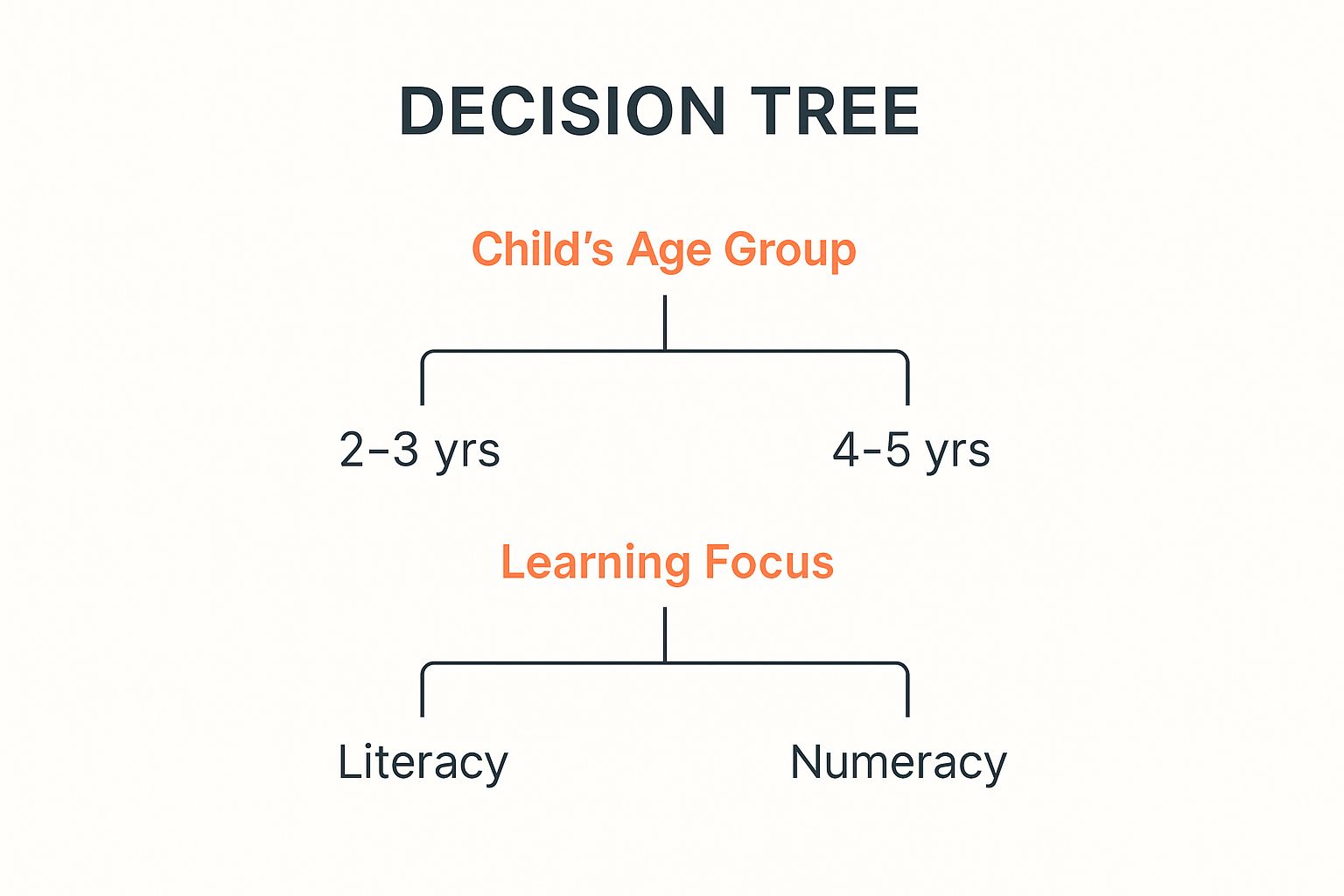
As you can see, the path to the right app always starts with your child’s specific developmental stage and needs.
Trusting Your Gut in a Growing Market
The world of preschool education software is exploding. But did you know the market is projected to more than double in the next decade? All that growth means more options for us, but it also means a lot more noise to filter through. You can learn more about the preschool app market trends here.
Ultimately, the best tool for choosing an app is your own intuition. You know your child better than anyone. If an app feels right for your family—if it sparks joy, curiosity, and kindness—then you’ve found a winner.
By making confident, informed choices, you’re not just downloading another app. You're hand-picking experiences that will help your child grow into a curious, kind, and resilient person, all while giving yourself that much-needed moment of guilt-free peace.
We Get It. You've Got Questions.
Ever find yourself wondering if that hour of screen time is really okay? Or eyeing a “free” app with a bit of suspicion? Trust me, you’re asking all the right questions. Let’s clear things up so you can feel confident about the digital tools you choose for your child.
How Much Screen Time Is Actually Okay for a Preschooler?
So, what's the magic number? Most experts, including the American Academy of Pediatrics, suggest about one hour of high-quality screen time per day for kids between 2 and 5. But life doesn’t always stick to a neat schedule. The real secret isn't obsessively counting the minutes, but making every minute count.
Think of it this way: an hour spent together exploring an interactive story that teaches kindness is worlds away from an hour of your child passively watching random videos. It’s less of a strict stopwatch rule and more of a daily goal for meaningful, shared digital moments.
How Can I Spot a Genuinely Good Educational App?
How do you know if an app will make your child think, or just keep them busy? Look for active participation over passive screen-staring. Does it challenge them to solve a problem, or is it just asking for mindless tapping?
The best educational apps are built around curiosity and open-ended play. Lunesia, for example, is a perfect model of this. Kids don't just follow a story—they get to shape it with their choices, learning about empathy and consequences in a safe, ad-free world.
Are “Free” Educational Apps Actually Safe?
It’s a tempting offer, right? But "free" almost always comes with a hidden cost. Many of these apps are packed with distracting ads, endless pop-ups for in-app purchases, and some might even be collecting your child's data behind the scenes. These interruptions don't just break the flow of learning; they can expose your little one to content you never approved.
While a few good free options are out there, a subscription-based app usually offers a much safer, more focused environment. It’s a small investment in your peace of mind, ensuring your child’s digital playground is built for their growth, not for advertisers.
Ready to turn screen time into a magical, guilt-free learning adventure? See for yourself how Lunesia uses interactive stories to build courage, kindness, and confidence in your child. Start your free trial today and watch their imagination soar!
